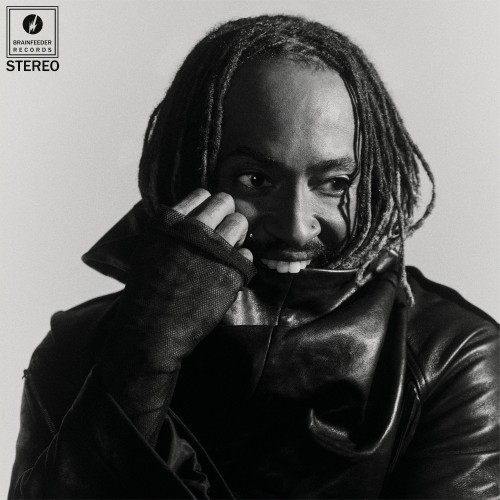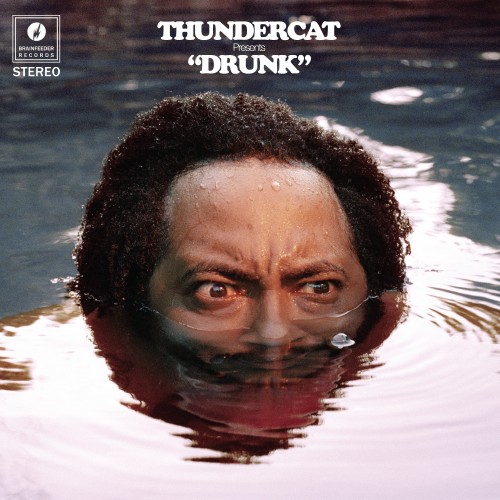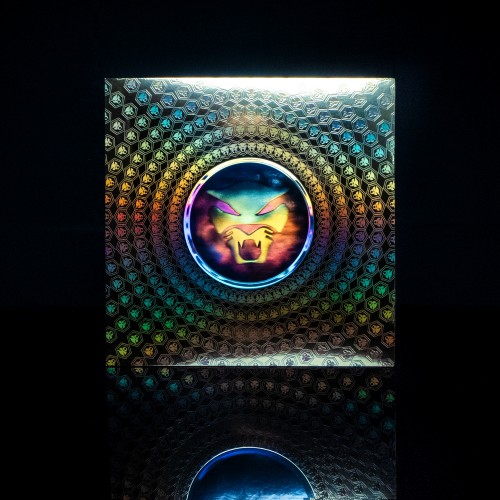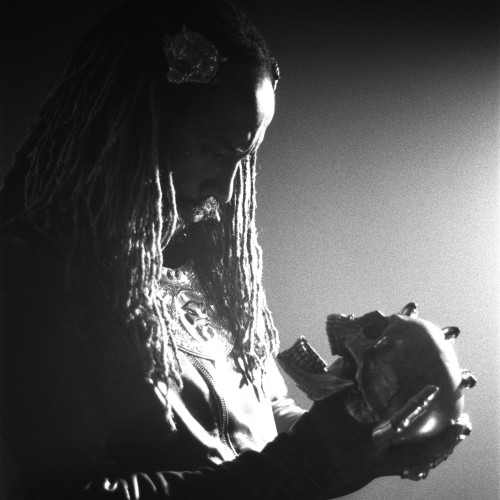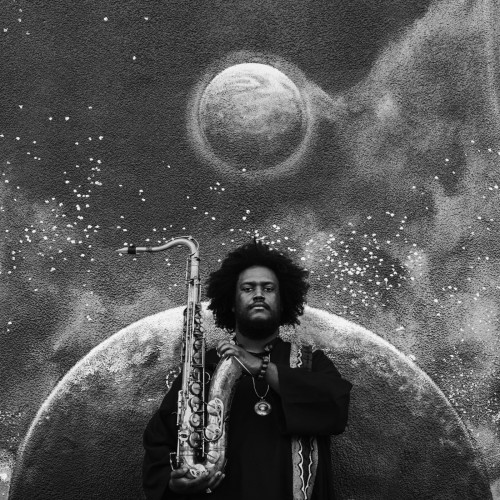The Golden Age of Apocalypse
by Thundercat
— Released 29th August 2011 on Brainfeeder
If indeed “you blows who you is”, as Louis Armstrong once famously said, then Stephen Bruner’s bass is a mainline to the soul of a man whose DNA was transcribed from the stars onto staff paper. His Flying Lotus-produced debut, The Golden Age of Apocalypse, offers both stone-cold skill and uncanny astrality, picking up where the pair left off on 2010’s Cosmogramma and further distilling the jazz current running through that landmark Lotus release. A longtime contributor to others’ al...
If indeed “you blows who you is”, as Louis Armstrong once famously said, then Stephen Bruner’s bass is a mainline to the soul of a man whose DNA was transcribed from the stars onto staff paper. His Flying Lotus-produced debut, The Golden Age of Apocalypse, offers both stone-cold skill and uncanny astrality, picking up where the pair left off on 2010’s Cosmogramma and further distilling the jazz current running through that landmark Lotus release. A longtime contributor to others’ albums, Bruner, aka Thundercat, is accompanied by an impressive cast ranging from Erykah Badu to members of Sa-Ra and J*DaVeY, to pianist Austin Peralta and his own Grammy-winning brother, drummer Ronald Bruner, Jr. Still, the end result is unmistakably a Thundercat record -- a lush and magical document combining classic jazz fusion, futurist electronic strains and timeless musical seeking.
A native of South Los Angeles, Bruner found his instrument at the age of 4. That made him a late-bloomer in the house of Ronald, Sr., who drummed with the Temptations among others. His first bass was a black Harmony, and he practiced to the Ninja Turtles soundtrack until Pops played him Jaco Pastorius. School was a blur of lessons, sessions and waking up for zero periods. At 15, he scored a hit in Germany as part of the short-lived boy band No Curfew. At 16, he toured Japan with soul man Leon Ware and joined thrash legends Suicidal Tendencies (he’s still their bassist). More road and studio time followed, with everyone from Stanley Clarke to Snoop Dogg to Eric Benét. Eventually the name Thundercat stuck, a reference to the cartoon he’s loved since childhood and an extension of Bruner’s wide-eyed, vibrant, often superhuman approach to his craft. As one writer put it, he’s “a mutant jazz cat”, nuff said.
Spanning a cosmic stew of players, locations and times, The Golden Age of Apocalypse was years in the making even though Bruner had never planned on releasing his own music. But Lotus spurred him on, and each song became a journey. There’s the ebullient “Daylight”, a soft whirl of bluesy piano, New Age synth, snapping beats and warm bass. There’s “Walkin’”, an upbeat soul strutter powered by Bruner’s digitally distorted plucks. There are raw, improvised numbers like “Jamboree” and virtuosic bass pileups like “Fleer Ultra”. One of the album’s most stunning moments arrives with a spacious cover of George Duke’s “For Love I Come”, a taut beauty spangled with crystalline harp and keys. Bringing this string of divinely unexpected moments to a moody and cinematic close is “Return to the Journey”. There, Bruner sings, “Time will pass us by", but listeners needn’t worry. Inside of this space, time really isn’t a thing...
The Golden Age of Apocalypse
by Thundercat
— Released 29th August 2011 on Brainfeeder
Digital |
|---|
|
SAVE TO SPOTIFY
Add this release to your Spotify account now You will be asked to login with your Spotify Account Read our Terms & Conditions about this service here |
| MP3 (BFDNL023) |
| 16-bit WAV (BFDNL023W) |
Physical |
Digital |
||
|---|---|---|---|
| LP (BF023) |
SAVE TO SPOTIFY
Add this release to your Spotify account now You will be asked to login with your Spotify Account Read our Terms & Conditions about this service here |
||
| CD (BFCD023) | MP3 (BFDNL023) | ||
| 16-bit WAV (BFDNL023W) | |||
Bundles |
||
|---|---|---|
|
Tracklist
- CD
- LP
- MP3
- 16-bit WAV
-
1
HooooooO
-
2
Daylight
-
3
Fleer Ultra
-
4
Is It Love?
-
5
For Love (I Come Your Friend)
-
6
It Really Doesn't Matter to You
-
7
Jamboree
-
8
Boat Cruise
-
9
Seasons
-
10
Goldenboy
-
11
Walkin'
-
12
Mystery Machine (The Golden Age of Apocalypse)
-
13
Return to the Journey
-
Play All (13)
-
1
HooooooO
-
2
Daylight
-
3
Fleer Ultra
-
4
Is It Love?
-
5
For Love (I Come Your Friend)
-
6
It Really Doesn't Matter to You
-
7
Jamboree
-
8
Boat Cruise
-
9
Seasons
-
10
Goldenboy
-
11
Walkin'
-
12
Mystery Machine (The Golden Age of Apocalypse)
-
13
Return to the Journey
-
Play All (13)
If indeed “you blows who you is”, as Louis Armstrong once famously said, then Stephen Bruner’s bass is a mainline to the soul of a man whose DNA was transcribed from the stars onto staff paper. His Flying Lotus-produced debut, The Golden Age of Apocalypse, offers both stone-cold skill and uncanny astrality, picking up where the pair left off on 2010’s Cosmogramma and further distilling the jazz current running through that landmark Lotus release. A longtime contributor to others’ al...
If indeed “you blows who you is”, as Louis Armstrong once famously said, then Stephen Bruner’s bass is a mainline to the soul of a man whose DNA was transcribed from the stars onto staff paper. His Flying Lotus-produced debut, The Golden Age of Apocalypse, offers both stone-cold skill and uncanny astrality, picking up where the pair left off on 2010’s Cosmogramma and further distilling the jazz current running through that landmark Lotus release. A longtime contributor to others’ albums, Bruner, aka Thundercat, is accompanied by an impressive cast ranging from Erykah Badu to members of Sa-Ra and J*DaVeY, to pianist Austin Peralta and his own Grammy-winning brother, drummer Ronald Bruner, Jr. Still, the end result is unmistakably a Thundercat record -- a lush and magical document combining classic jazz fusion, futurist electronic strains and timeless musical seeking.
A native of South Los Angeles, Bruner found his instrument at the age of 4. That made him a late-bloomer in the house of Ronald, Sr., who drummed with the Temptations among others. His first bass was a black Harmony, and he practiced to the Ninja Turtles soundtrack until Pops played him Jaco Pastorius. School was a blur of lessons, sessions and waking up for zero periods. At 15, he scored a hit in Germany as part of the short-lived boy band No Curfew. At 16, he toured Japan with soul man Leon Ware and joined thrash legends Suicidal Tendencies (he’s still their bassist). More road and studio time followed, with everyone from Stanley Clarke to Snoop Dogg to Eric Benét. Eventually the name Thundercat stuck, a reference to the cartoon he’s loved since childhood and an extension of Bruner’s wide-eyed, vibrant, often superhuman approach to his craft. As one writer put it, he’s “a mutant jazz cat”, nuff said.
Spanning a cosmic stew of players, locations and times, The Golden Age of Apocalypse was years in the making even though Bruner had never planned on releasing his own music. But Lotus spurred him on, and each song became a journey. There’s the ebullient “Daylight”, a soft whirl of bluesy piano, New Age synth, snapping beats and warm bass. There’s “Walkin’”, an upbeat soul strutter powered by Bruner’s digitally distorted plucks. There are raw, improvised numbers like “Jamboree” and virtuosic bass pileups like “Fleer Ultra”. One of the album’s most stunning moments arrives with a spacious cover of George Duke’s “For Love I Come”, a taut beauty spangled with crystalline harp and keys. Bringing this string of divinely unexpected moments to a moody and cinematic close is “Return to the Journey”. There, Bruner sings, “Time will pass us by", but listeners needn’t worry. Inside of this space, time really isn’t a thing...


